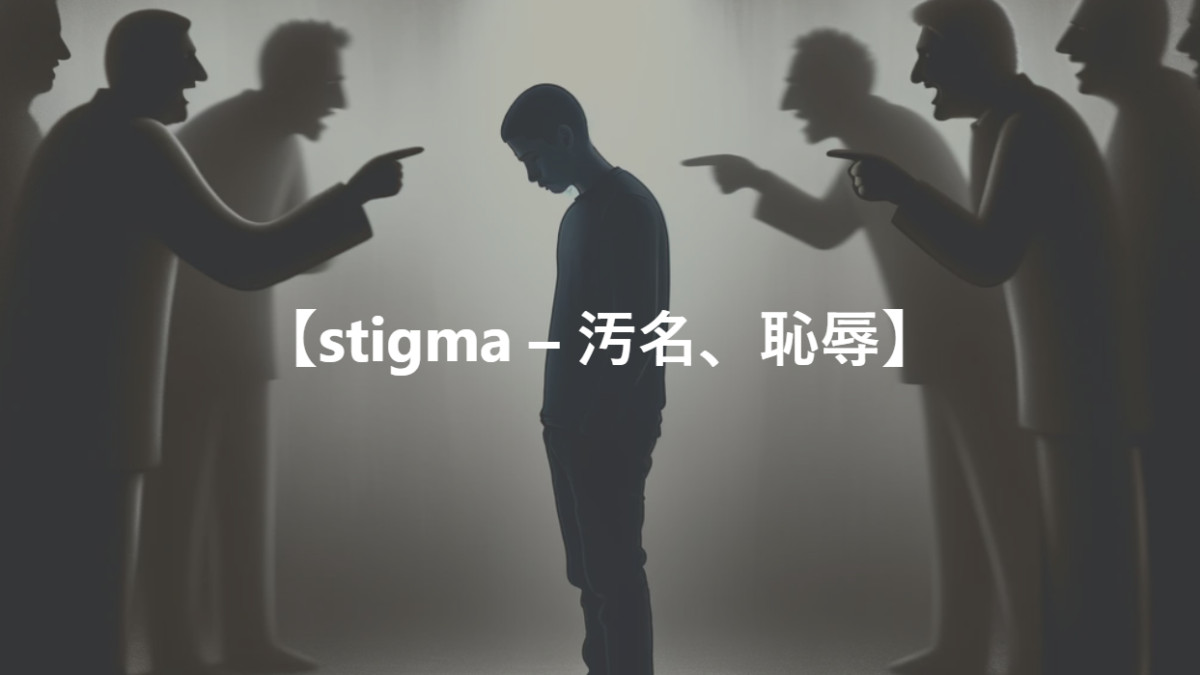語源・類義語・反対語・例文
【stigma – 汚名、恥辱】という単語の語源とか由来を知っていますか?
「stigma」という単語は、古代ギリシャ語の「στίγμα」(stigma)から派生しました。元々は、動詞「στίζω」(stizo)から派生した名詞形であり、文字通りには「刺し傷」「刻印」を意味していました。
この言葉は、ギリシャの古代社会において奴隷や犯罪者に対する身体的な刻印や印章を指すことが一般的でした。その後、転じて社会的な不名誉や汚名、恥辱を指すようになりました。
現代の用法では、社会的な差別や偏見によって個人やグループに対して押し付けられる否定的なレッテルや評価を意味します。このような意味合いで「stigma」は使用され、特定の特徴や行動によって個人が社会的な非難や排斥を受ける状況を表現します。
The word “stigma” is derived from the ancient Greek word “στίγμα” (stigma). Originally, it was the noun form of the verb “στίζω” (stizo), which literally means “a mark or puncture” especially made by a pointed instrument.
In ancient Greek society, this term commonly referred to the physical marks or brands used on slaves or criminals. Over time, it evolved to signify social disgrace, infamy, or dishonor.
In modern usage, “stigma” denotes the negative label or judgment imposed on individuals or groups by societal discrimination or prejudice. It is used in this sense to describe situations where individuals face social condemnation or exclusion based on specific characteristics or behaviors.
この単語の類義語・反対語を教えてください。
類義語
- Disgrace: 不名誉。社会的な承認を失い、名誉が汚された状態。
- Infamy: 悪名。非常に悪い評判や名声。
- Shame: 恥。個人の内面や社会的な評価における否定的な感情や状態。
- Dishonor: 不名誉。誇りや尊厳が損なわれること。
- Brand: 烙印。特定の否定的な特徴で人を区別するためのレッテル。
反寧語
- Honor: 名誉。高い道徳的価値や社会的承認を受ける状態。
- Prestige: 威信。高い評価や尊敬を受けること。
- Esteem: 尊敬。他人から高く評価されること。
- Respect: 尊重。個人の価値や地位を認識し、敬う態度。
- Reputation: 評判。人が社会において持つ、一般的な評価や見解。
似た単語で間違いやすい単語はありますか?
- Stereotype(ステレオタイプ): 特定のグループに対する固定観念や一般化された見解。ステレオタイプは偏見や差別の根源になることがありますが、「Stigma」よりも広い範囲の概念で、必ずしも個人に対する具体的な汚名や恥辱を指すわけではありません。
- Prejudice(偏見): 事前の知識や理解なしに形成される否定的な態度や見解。「Stigma」と同様に否定的な社会的評価に関連しますが、偏見は特定の個人やグループに対する先入観や無根拠な判断を意味し、必ずしも公然とした汚名や恥辱を伴うわけではありません。
- Discrimination(差別): 性別、人種、宗教などの理由で人々を不当に扱う行為。「Stigma」と同じく社会的な排斥を伴うことがありますが、差別はより行動や政策に関連する言葉で、特定の行動による不平等な扱いを指します。
この単語を使った例文をいくつか教えてください。
Mental illness still carries a social stigma, causing many individuals to suffer in silence.
(精神疾患にはまだ社会的な汚名がついており、多くの人々が黙って苦しんでいます。)
The stigma associated with being a single parent has decreased in recent years.
(シングルパレントであることに関する汚名は、最近の年において減少しています。)
There is a stigma attached to unemployment, often causing feelings of shame and inadequacy.
(失業には汚名が付きまとい、しばしば恥と不適切さの感情を引き起こします。)
People with tattoos used to face a social stigma, but attitudes have shifted in recent times.
(かつてはタトゥーを持つ人々が社会的な汚名を受けることがありましたが、最近では態度が変わっています。)
The stigma surrounding HIV/AIDS prevents many individuals from seeking proper medical care and support.
(HIV/AIDSに関する汚名は、多くの人々が適切な医療やサポートを求めることを妨げています。)
【stigma – 汚名、恥辱】のコロケーション
- Social stigma – 社会的汚名
- 個人やグループが、社会の一部から受ける否定的な判断や評価。特定の特徴、行動、または状態が原因で、差別や排除の対象となることを指します。
- Stigma attached to – ~に付随する汚名
- ある行動、状態、病気などに関連している社会的な偏見や差別。この表現は、特定の事柄に対する否定的な社会的な認識や態度があることを示します。
- Stigma of mental illness – 精神疾患の汚名
- 精神疾患や障害を持つ人々に対して存在する社会的な偏見や差別。この汚名は、支援や治療を求める際の障壁となることがあります。
- Reduce the stigma – 汚名を減らす
- 社会的な偏見や差別を軽減する行動やプロセス。啓発活動や教育を通じて、特定の事柄に対する否定的な認識を変えようとする努力を指します。
- Overcome the stigma – 汚名を克服する
- 個人や集団が、彼らに対する社会的な汚名や偏見を乗り越え、正常な生活を送ること。このプロセスは、自己受容や社会の意識変革を含むことがあります。
「Stigma」(汚名、恥辱)は、社会的なレッテルや否定的な評価を示す際に用いられる単語です。この言葉は、個人やグループが特定の特徴、行動、または状態によって、社会からの差別や排除を受けることを表します。以下に、この単語を含む一般的な言い回しや状況を示します。
社会的汚名(Social stigma)は、社会の一部から個人やグループに対して抱かれる否定的な判断や評価を指します。これは、特定の特徴や行動が原因で、その人たちが差別や社会的な排斥の対象となる状況を示します。
~に付随する汚名(Stigma attached to)は、特定の行動や状態、病気などに関連する社会的な偏見や差別を意味します。この表現は、ある事柄に対する否定的な社会的認識が存在することを示しています。
精神疾患の汚名(Stigma of mental illness)は、精神疾患を持つ人々に対する社会的な偏見や差別を指し、これが治療や支援を求める際の障壁になることがあります。
汚名を減らす(Reduce the stigma)は、社会的な偏見や差別を軽減するための行動やプロセスを指します。これは、啓発活動や教育を通じて、特定の事柄に対する否定的な認識を変える努力を含みます。
汚名を克服する(Overcome the stigma)は、個人や集団が社会的な汚名や偏見を乗り越え、正常な生活を送ることを意味します。このプロセスには、自己受容や社会の意識変革が含まれることがあります。
これらのコロケーションを通じて、「Stigma」が社会的なレッテルや否定的な評価とどのように関連しているかが明らかになります。「Stigma」の使用は、特定の特徴や状況に対する社会的な偏見や差別が個人やグループに与える影響を表現するのに有効です。また、これらの表現は、汚名に関連する問題にどのように取り組み、それを減らしたり克服したりするかにも焦点を当てています。
The term “stigma” is used to describe social labels or negative evaluations applied to individuals or groups. This word conveys situations where people are discriminated against or excluded by society due to certain characteristics, behaviors, or conditions. Below are some common phrases and scenarios involving this term.
Social stigma refers to the negative judgment or evaluation that a part of society holds against individuals or groups. It highlights situations where people are subjected to discrimination or social ostracism because of specific attributes or behaviors.
Stigma attached to denotes societal prejudice or discrimination related to certain actions, conditions, or illnesses. This expression indicates the presence of negative social perceptions associated with a particular matter.
Stigma of mental illness points to the societal prejudice and discrimination faced by people with mental disorders or disabilities, which can become a barrier to seeking treatment or support.
Reduce the stigma is about actions or processes aimed at lessening societal prejudice and discrimination. It involves efforts to change negative perceptions about specific matters through awareness campaigns or education.
Overcome the stigma means for individuals or groups to surpass the social stigma and prejudice they face, enabling them to lead normal lives. This process may include self-acceptance or transforming societal attitudes.
Through these collocations, it becomes clear how “stigma” is linked to social labels and negative evaluations. The use of “stigma” effectively expresses the impact of societal prejudice and discrimination on individuals or groups. Furthermore, these expressions focus on how to address issues related to stigma, aiming to reduce or overcome it.
stigmaを使った文法問題
- There is still a social _____ associated with mental illness, preventing many from seeking help.
- (A) stigmatize
- (B) stigmatized
- (C) stigmatization
- (D) stigma
解答と解説: (D) stigma
解説: 空欄にはa social ~ の後に続く名詞が入ります。stigmaは「汚名、不名誉」という意味の名詞です。
- The organization is working to reduce the _____ of HIV/AIDS through education and awareness campaigns.
- (A) stigmatize
- (B) stigmatized
- (C) stigmatization
- (D) stigma
解答と解説: (D) stigma
解説: reduce the stigma of ~ で「~に対する偏見を減らす」という表現になります。
- In the past, people with certain diseases were _____ and ostracized by society.
- (A) stigmatize
- (B) stigmatized
- (C) stigmatization
- (D) stigma
解答と解説: (B) stigmatized
解説: 人々が「烙印を押された」という受動態を表すには過去分詞であるstigmatizedが適切です。
- The _____ surrounding addiction can make it difficult for people to seek treatment.
- (A) stigmatize
- (B) stigmatized
- (C) stigmatization
- (D) stigma
解答と解説: (D) stigma
解説: 空欄にはthe ~ of addictionの後に続く名詞が入ります。stigmaは「汚名、不名誉」という意味の名詞です。
- The company’s reputation was tarnished by the _____ of the financial scandal.
- (A) stigmatize
- (B) stigmatized
- (C) stigmatization
- (D) stigma
解答と解説: (D) stigma
解説: 空欄にはthe ~ of the financial scandalの後に続く名詞が入ります。stigmaは「汚名、不名誉」という意味の名詞です。

